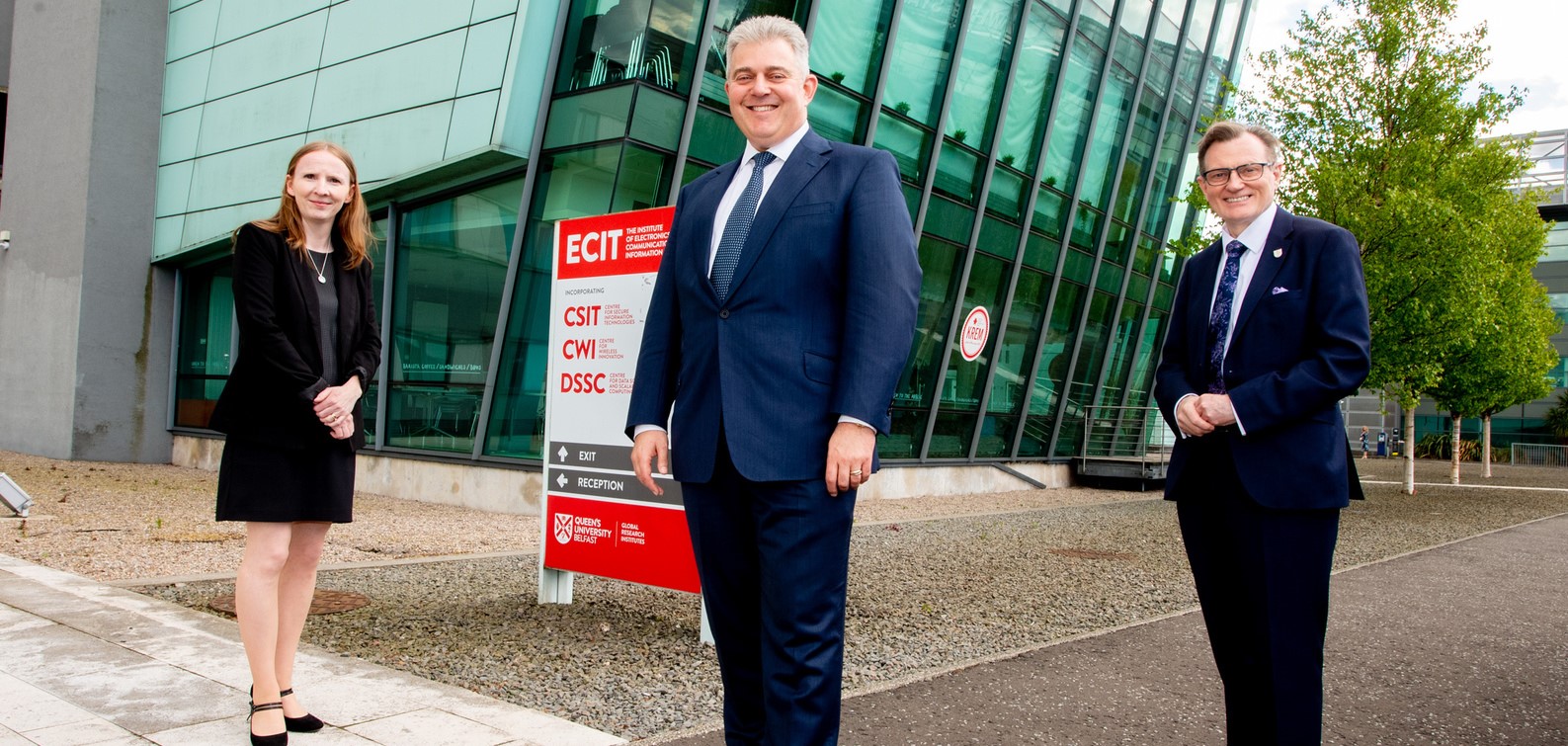FIGURES REVEALED AT ECIT SUMMIT SHOW CYBER SECURITY WORTH £110M IN SALARIES IN NI 
18 May 2021
A report launched at the Secure Connected Intelligence Summit, taking place this week at Queen’s (18-20 May) shows that Northern Ireland’s cyber sector now employs 2,300 people across 104 companies, generating £110m in salaries each year.
The three-day virtual event, opened by Secretary of State for Northern Ireland Brandon Lewis, is being hosted by ECIT - The Institute of Electronics, Communications and Information Technology at Queen’s – and over 300 delegates from across the UK and beyond will attend.
Now in its 10th year, the summit is exploring thought leadership, multi-disciplinary challenges, research and innovation at the interface between cybersecurity, wireless communications, and machine intelligence and how they can be applied in the fields of health and life sciences, agri-food, financial services and transport for the future.
Belfast-based Perspective Economics has collaborated with The Centre for Secure Information Technologies at ECIT to carry out a review of the cyber security sector in Northern Ireland, focussing on skills, employment and its economic potential.
Building on the strong research base at ECIT, the Northern Ireland Cyber Security Sector Snapshot 2021 found that that foreign direct investment has played a key role with Invest NI providing around £27m funding to support the creation of over 1,300 cyber security roles in Northern Ireland between 2015 and 2020.
The importance of growth in the sector is recognised in Northern Ireland Executive’s Economic Recovery Action Plan and the New Decade, New Approach deal which set a goal of achieving 5,000 cyber security jobs by 2030. In 2020 there were 1,955 people employed in cyber security roles and this has increased by 18% to 2,299 as of April 2021.
The sector has continued to grow throughout the pandemic and is well positioned to support economic recovery in the region. The report says that by increasing the number of jobs in the cyber security sector by 300 each year, reaching employment of 5,000 is achievable and would have a cumulative economic impact of up to £2.9bn for the local economy over the next decade of innovation.
Northern Ireland Secretary of State, Brandon Lewis, said:
"Cyber security is critical to our future prosperity - Northern Ireland is recognised as a global leader in the cybersecurity industry and is the top destination for US cybersecurity investment.
"There are 2,300 cyber professionals working in over 100 companies here and along with colleagues in the Executive, I look forward to seeing that rise to 5,000 and beyond over the coming years.
"As Secretary of State, I want to see Northern Ireland thrive. There’s lots of work to do but we have the ingredients to make real, positive, lasting change in the economy and the UK Government will do everything it can to create the conditions for that to happen.
"We will continue to work to deliver for people and businesses across Northern Ireland, as part of a strong United Kingdom, to ensure we can build back better and recover from the Covid-19 pandemic."
Professor Máire O'Neill, Director of ECIT and Director of the Research Institute in Secure Hardware and Embedded Systems (RISE) at CSIT, said:
“Our summit connects key government figures and academic and industry partners in the digital and innovation communities as we look towards the exciting possibilities for the next decade for continuing to deliver technological and societal advancement and regional and national economic impact.
“We know that cyber security offers a considerable economic opportunity for Northern Ireland, with average salaries of over £48,000, well above the private sector average, and it is welcome news that the report shows the sector is on track to employ 5,000 people by 2030.
“For this to happen we need to ensure we have a pipeline of talent and that we future-proof the skills of the workforce as well as promoting knowledge sharing and strong research and development partnerships between academia and industry. We also need to continue to work together to promote Northern Ireland nationally and internationally.”
Speakers at the summit include Dr Mike Short, Chief Scientific Adviser at Department for International Trade, former head of the National Cyber Security Centre Professor Ciaran Martin, now at the University of Oxford, and Miro Salem, Head of Acquisition at Rakuten Mobile, a Japanese telecommunications network.
The conference will also see the official opening of a new edge computing hub at Queen’s, a collaboration with Rakuten Mobile. Offering a faster solution for smart devices, edge computing is a next generation model that will revolutionise the way society uses the internet.
Media enquiries to Queen's Communications Office on telephone: +44 (0)28 9097 3091.
Caption – Pictured (L-R) are: Professor Máire O'Neill, Director of The Institute of Electronics, Communications and Information Technology (ECIT) at Queen’s; Secretary of State for Northern Ireland, Brandon Lewis; and Professor Ian Greer, President and Vice-Chancellor of Queen’s.
Back to Main News
Top of Page